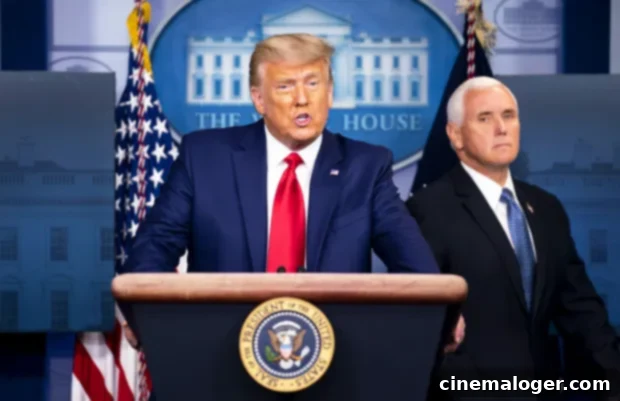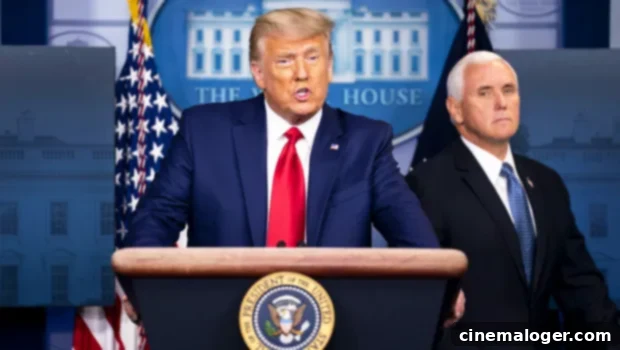Mike Pence’s Peril on January 6th: Unveiling Trump’s Pressure and the Capitol Attack’s Near Catastrophe
The events of January 6th, 2021, at the U.S. Capitol marked a dark day in American history, an insurrection fueled by baseless claims of election fraud. During a pivotal hearing of the House Select Committee investigating the attack, Representative Pete Aguilar (D-CA) presented startling revelations that underscored the grave danger Vice President Mike Pence faced that day. Insurrectionists, driven by an fervent belief that the 2020 election had been stolen and egged on by former President Donald Trump’s rhetoric, came alarmingly close to the Vice President, at one point reportedly within a mere 40 feet of his secure location. This chilling proximity was revealed as the hearing meticulously detailed the intense pressure exerted by then-President Trump on Pence to illegally overturn the certified results of the 2020 presidential election. Trump’s relentless campaign culminated in his supporters storming the Capitol, with some even chanting “Hang Mike Pence,” demonstrating the profound and personal threat directed at the Vice President for upholding his constitutional duty.
The Jan 6 committee revealed how Trump was ‘pouring gasoline on the fire’ by sending out an incendiary tweet against Mike Pence — and that rioters came as close as ’40 feet’ from the VP pic.twitter.com/1vSOgQJ1Dl
— NowThis (@nowthisnews) June 16, 2022
The committee presented compelling evidence, including harrowing footage of the rioters’ violent actions, carefully interwoven with recorded interviews from Pence’s staff and a timeline of incendiary tweets sent by Donald Trump throughout that chaotic day. It was within this context that Aguilar disclosed the alarming proximity of the attackers to Vice President Pence. After breaching the Capitol building, a significant number of rioters managed to enter the crypt area, a space located directly beneath where Pence was being secured before his eventual evacuation. This breach highlighted the severe breakdown in security and the immediate threat to the Vice President. Chris Hodgson, Pence’s Director of Legislative Affairs, recounted in a pre-recorded deposition, “The Secret Service couldn’t control the situation and do their job of keeping him safe.” Pence was subsequently moved to an undisclosed, more secure location within the Capitol complex, where he remained for approximately four agonizing hours while the siege continued outside.
The gravity of the situation was further underscored by the testimony of Pence’s former counsel, Greg Jacob, who expressed genuine shock upon learning just how close the attackers had come. “I can hear the din of the rioters in the building while we moved, but I don’t think I was aware that they were as close as that,” Jacob explained, articulating the terrifying reality that unfolded beneath the surface of the Vice President’s determined facade. Aguilar further bolstered this point by referencing chilling intelligence received by the Department of Justice from an informant within the extremist group the Proud Boys. This informant explicitly stated that members of the group “would’ve killed Mike Pence if given a chance,” a stark and horrifying testament to the direct and deadly threat Pence faced for refusing to bend to Trump’s unconstitutional demands. This revelation paints a vivid picture of the sheer fanaticism and violent intent that propelled the insurrectionists.
Despite the escalating danger and urgent recommendations from his security detail, Vice President Pence steadfastly refused to evacuate the Capitol. Greg Jacob confirmed that Pence was “determined” to fulfill his constitutional duty to certify the electoral votes that day. Pence’s resolve stemmed from a deep-seated commitment to the democratic process and a deliberate decision not to capitulate to the rioters’ demands. “The Vice President did not want to take any chance that the world would see the Vice President of the United States fleeing the United States Capitol,” Jacob elaborated. This strategic decision was not merely about personal bravery; it was a powerful symbolic act meant to project stability, uphold the rule of law, and demonstrate the unwavering continuity of government even under siege. Pence understood that his presence was crucial to reaffirming the peaceful transfer of power, a cornerstone of American democracy.
Adding another layer to the narrative of betrayal and abandonment, Jacob also revealed that Donald Trump made no effort to contact Mike Pence or his wife, Karen, to ensure their safety during the violent assault on the Capitol. This profound lack of concern from the President towards his own Vice President, who was literally under threat for carrying out his duties, left both Mike and Karen Pence feeling a deep sense of “frustration.” This testimony starkly highlighted Trump’s singular focus on overturning the election results, seemingly at the expense of his Vice President’s well-being and the safety of all those within the Capitol building. The absence of a simple call underscored the transactional nature of their relationship and Trump’s apparent disregard for the personal danger Pence faced.
The initial segment of the hearing painstakingly chronicled the weeks leading up to January 6th, detailing the relentless and multi-faceted pressure campaign mounted by Donald Trump against his Vice President. Evidence presented by the committee unequivocally demonstrated that Trump was fully aware that Pence possessed no constitutional or legal authority to overturn the results of the 2020 election, and that any such action would be profoundly illegal and unconstitutional. Despite receiving clear advice from numerous legal experts, including his own White House counsel, Trump persisted in pressuring Pence publicly and privately, leveraging his position to demand an outcome he knew was impossible and unlawful. This deliberate attempt to subvert democratic processes, despite knowledge of its illegality, formed the crucial backdrop to the ensuing violence at the Capitol.
The third hearing, which provided these harrowing details, came after a previously scheduled session for Wednesday was postponed to a later date. The committee’s ongoing investigative work is expected to continue, with the next hearing scheduled to take place on Tuesday, June 21, as reported by NPR. During her powerful opening statements at the committee’s inaugural hearing on June 9, Representative Liz Cheney (R-WY) did not mince words, asserting that Donald Trump bore direct responsibility for provoking the mob that launched the attack on the Capitol. “President Trump summoned the mob, assembled the mob, and lit the flame of this attack,” she declared, laying bare the committee’s central argument that the former President was the architect of the January 6th insurrection. Her statements set a clear tone for the investigation, aiming to hold accountable those responsible for the unprecedented assault on American democracy.

Even with only a handful of public hearings completed, the Select Committee has already unearthed a wealth of critical new information surrounding Trump’s persistent and unsubstantiated claims of widespread election fraud. Former Attorney General William Barr, in compelling pre-recorded interviews, testified that he had explicitly informed the former president that he “didn’t see evidence of voter fraud” that would have altered the election outcome. Barr also dismissed the outlandish conspiracy theories circulating about Dominion Voting Machines as entirely baseless. He recounted his direct conversations with Trump, stating, “I told them that it was crazy stuff and they were wasting their time on that and [it] was doing a great, grave disservice to the country.” Barr’s testimony was particularly impactful, coming from the nation’s top law enforcement official, debunking the very claims that fueled the January 6th attack. Predictably, Donald Trump swiftly “fired back” at Barr’s assertions on his Truth Social platform, continuing his narrative of a stolen election and dismissing his former Attorney General’s conclusions.
Further illuminating the chaotic and ethically dubious environment within the Trump campaign on Election Night 2020, former campaign aides Jason Miller and Bill Stepien offered their sworn testimonies regarding Rudy Giuliani’s behavior. Both claimed that Trump’s personal attorney, Giuliani, was visibly “intoxicated” on Election Night. They vividly described Giuliani’s state when he advised President Trump to prematurely declare victory, long before the comprehensive counting of votes had concluded. Miller stated in his deposition, “The mayor was definitely intoxicated, but I did not know the level of his intoxication when he spoke to the president. There were suggestions by—I believe it was—Mayor Giuliani to go and declare victory and say that we’d won it outright.” This testimony painted a picture of a campaign making momentous decisions under questionable influence, further casting doubt on the legitimacy and rationale behind the calls to overturn the election. The former NYC mayor has since publicly denied these serious claims on Twitter, insisting he was only consuming Diet Pepsi on election night, an assertion that stands in stark contrast to the sworn statements of multiple former campaign officials.
